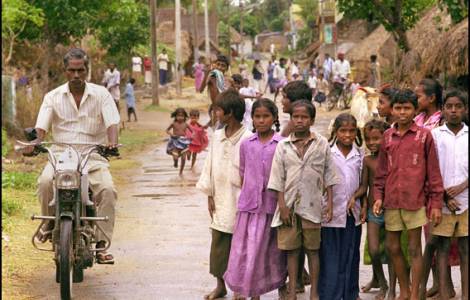
NCDHR
Bangalore (Agenzia Fides) - The Indian Bishops, gathered in Bangalore for the assembly of the Indian Bishops' Conference (which brings together the Pastors of the Latin, Syro-Malabar and Syro-Malankara rites) have reaffirmed their commitment and involvement in promoting and supporting the life and social status of the Dalits.
The Dalits ("untouchables") are the indigenous peoples who, in the Brahminical vision – advocate of a social system made up of inequality and classified hierarchy - were subject to the dominant castes and were deprived not only of their human dignity, but also the right to be human. Their lives were marked by extreme poverty, unworthiness, shame and humiliation, impotence and social exclusion. India has a population of 200 million Dalits who still live, for the most part, as landless peasants in the villages.
In their assembly the Bishops recalled that the Church should not only promote development programs and social inclusion of the Dalits, but is called to "initiate a deeper understanding of the causes and manifestations of deprivation, discrimination and exclusion of Dalit Christians within the Church, by the larger society and by the State", explains Jesuit Father A. Maria Arul Raja, a professor of Religious Studies at the Jesuit Theology Centre in Chennai, who spoke at the meeting of the Catholic Bishops. At the end of the plenary assembly, the Bishops have committed themselves to helping Catholic educational institutions to create spaces for disadvantaged Dalit students; to promote initiatives aimed at promoting the rights and development of Dalits and to remove every trace of discrimination based upon caste.
In India, Christians are approximately 2.3 percent of the population, of which around 60 percent are Dalits. In December, 2016, the Indian Bishops issued a “Policy of Dalit Empowerment in the Catholic Church in India” which Raja said made "Dalits, both from within and outside the Church, feel that they have been abundantly blessed with the Kairos moment".
However, the Jesuit observes that even the Church "although it promotes the power of the Gospel of compassionate justice and righteous egalitarianism as breathed out by the Risen Lord Jesus Christ, we the Church seem to have fallen under the violent burden of caste culture of fragmentation", with the simple defeatist excuse that "caste cannot be eliminated".
Raja notes that Dalits suffer discrimination even when they are Hindus, "but members of scheduled castes who are Christians suffer additional discrimination based on their faith, as well as losing eligibility for government assistance programs available to other hindu Dalits, Sikhs or Buddhists". The first president of India signed a presidential order on August 10, 1950: for this reason, the Catholic Bishops’ Conference of India has designated August 10 to be observed as a "black day", and called for meetings, rallies, candle-light vigils, and other forms of demonstrations to be organized to show support and solidarity to those Christians and Muslims belonging to scheduled castes who are suffering the injustice of having their legal rights denied.
The Catholic Bishops have also joined with the National Council of Churches in India (which unites the Protestant denominations) to institute "Dalit Liberation Sunday" every second Sunday of November. On this day, Dalits also march for the rights in cities across the country, supported in their fight for human rights. A civil petition asking for the deletion of the paragraph of the 1950 presidential order denying Dalit status to Christians and Muslims has been languishing in the courts for over a decade and is currently pending before India’s Supreme court. According to Raja, Dalit Christians, "are really consoled to see the entire body of the Church and the CBCI to walk with them with creative pastoral commitment".(PN) (Agenzia Fides, 9/2/2018)